 |
|
||||||||||
|
|
|||||||||||
Hot Careers in BiochemistryMaking the right choice and getting your foot in the door:
|
||||||||||||||||
Fields requiring skills in biochemistry and molecular biology |
|
|
Molecular Neurobiology |
Pest Control Services |
In the sections below we briefly describe a few of the many exciting possibilities available. The listing is by no means comprehensive. It is intended to get you started on your hunt. More than anything else, we want you to consider all of the different options available. Remember, it is your future that is at stake.
RELATIVELY MAINSTREAM CHOICES
Heading Off to Do Business
It is fair to say that the techniques of biochemistry and molecular biology that have been developed over the last fifteen to twenty years have transformed the medical and pharmaceutical industries in as overwhelming a fashion as the Internet is transforming general business. Once searches for new drugs, for example as cancer treatments, involved testing thousands upon thousands of almost random sets of chemicals. Today, the recent knowledge we have gained about the specific genes involved in cellular processes allows for individually targeting these genes or their products for therapy. While efforts such as the Human Genome Project and similar research on other genomes are pouring forth a wealth of information about gene sequences, we also need to be able to interpret that information. So, on both sides of such endeavors people with biochemical and molecular biology training are needed and job opportunities abound in such fields as functional genomics and bioinformatics.
 Along with genetic sequence information, functional characterization of the gene products and how they interact is also proceeding apace. Atomic-level structural information about enzymes, receptors, allosteric interactions and nucleic acids is becoming available in an ever-increasing stream through improvements in X-ray crystallography and NMR techniques. To put these structures to use (for understanding disease states and for their treatment, for example) takes highly trained individuals and here, also, job availability exceeds the number of qualified applicants.
Along with genetic sequence information, functional characterization of the gene products and how they interact is also proceeding apace. Atomic-level structural information about enzymes, receptors, allosteric interactions and nucleic acids is becoming available in an ever-increasing stream through improvements in X-ray crystallography and NMR techniques. To put these structures to use (for understanding disease states and for their treatment, for example) takes highly trained individuals and here, also, job availability exceeds the number of qualified applicants.
Advances in rational drug design have been spurred by the use of new methods of combinatorial chemistry combined with exquisitely precise selection procedures (often involving ligand affinities of biomolecules) and the utilization of high throughput robotics. It is not uncommon today to be able to select from a cast, not of several thousand potential drug candidates, but from many millions.
In contrast to the situation of twenty or more years ago when the search for new drug therapies was concentrated in just a relatively few pharmaceutical companies, today there is a much wider field. Small biotechnology companies compete very effectively with the pharmaceutical giants, especially when concentrating on just a single type of disease. For those looking for employment this means a corresponding expansion of the job market.
This growing use of molecular biology approaches is not limited to pharmaceuticals but applies as well to fields such as agricultural chemicals, new processing techniques, bioremediation, and a host of other industrial applications.
 Emphasizing the Business Side
Emphasizing the Business Side
An increasing percentage of students are complementing their scientific skills and backgrounds with strong training in business by pursuing an MBA degree. Such dual proficiency opens up a broad range of opportunities. For example, it can lead to employment as a Technology Officer in the biotechnology and pharmacy sectors. The combination of savvy business skills along with a strong science background is particularly in demand by biotech start-up companies. Well-established pharmaceutical and biochemical businesses also constantly seek people with industrial administration skills.
Staying In School – Working as a Research Assistant
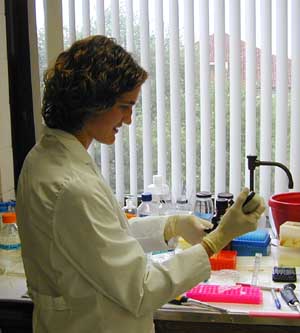 One opportunity often overlooked is the possibility of joining a research group at an academic institution. For students graduating with bachelor’s or master’s degrees, the positions typically are available at the Technical Research Assistant level. Working as a Research Assistant offers many possible types of activities. One could work directly with a Senior Investigator acting as a second set of skilled "hands," or perhaps as a part of a large team working on a long-term project. Research Assistants who can not only perform experiments but are also capable of offering critical analysis of the results are particularly sought after.
One opportunity often overlooked is the possibility of joining a research group at an academic institution. For students graduating with bachelor’s or master’s degrees, the positions typically are available at the Technical Research Assistant level. Working as a Research Assistant offers many possible types of activities. One could work directly with a Senior Investigator acting as a second set of skilled "hands," or perhaps as a part of a large team working on a long-term project. Research Assistants who can not only perform experiments but are also capable of offering critical analysis of the results are particularly sought after.
One excellent way to see what is available in your vicinity is to explore the job openings on the university’s website. Check also with departmental offices and with individual professors to determine if they know of current or future available positions. Don’t restrict yourself to your home institution. Look for possibilities at other colleges, and at medical, dental, or veterinary facilities as well, for they often offer a range of exciting possibilities for Research Assistants!
Being in School – Working as a Science Teacher
 With the pace of change in the sciences today, especially in biochemistry and molecular biology, there has never been a greater need for qualified teachers in our primary and secondary schools. While teaching has never been noted for providing the most outstanding financial gains, it offers a host of other rewards. It is exhilarating to see a student’s eyes brighten as she begins both to understand not only how new discoveries in biology and medicine work, but also how these advances might be applied in the future. To be able to teach about what research on the human genome is all about. and even to do cloning experiments in high school laboratories, offers vistas of science unparalleled in former generations.
With the pace of change in the sciences today, especially in biochemistry and molecular biology, there has never been a greater need for qualified teachers in our primary and secondary schools. While teaching has never been noted for providing the most outstanding financial gains, it offers a host of other rewards. It is exhilarating to see a student’s eyes brighten as she begins both to understand not only how new discoveries in biology and medicine work, but also how these advances might be applied in the future. To be able to teach about what research on the human genome is all about. and even to do cloning experiments in high school laboratories, offers vistas of science unparalleled in former generations.
Opportunities in Government
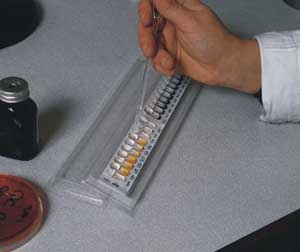 Along with expanded opportunities in biotechnology and related fields in the private sector have come similar expansions in these areas in the federal, state, and local governments. These range from purely research-related activities, for example as a Technical Research Assistant exploring new environmental pest control methods for the Department of Agriculture, to providing scientific support and advice to a local City Council, to working on the development of new federal efforts in the area of integrated pest management. The range is enormous.
Along with expanded opportunities in biotechnology and related fields in the private sector have come similar expansions in these areas in the federal, state, and local governments. These range from purely research-related activities, for example as a Technical Research Assistant exploring new environmental pest control methods for the Department of Agriculture, to providing scientific support and advice to a local City Council, to working on the development of new federal efforts in the area of integrated pest management. The range is enormous.
A few of the many possibilities include:
Fields requiring skills in biochemistry and molecular biology |
|
|
Federal |
State and City: |
LOOKING OUTSIDE THE BOX
Combining Your Science and Writing Skills
 Today there are a wide range of opportunities for individuals who can write clearly, accurately, and effectively. Jobs for people with solid writing and science skills include working as a Scientific Writer/Reporter for newspapers, magazines, or for the audio and visual media. Proficient technical writers are always in demand by industry for tasks such as preparing reports, assisting with the development of public presentations by Senior Administrators, generating material for annual reports, and compiling scientific details for patent filings.
Today there are a wide range of opportunities for individuals who can write clearly, accurately, and effectively. Jobs for people with solid writing and science skills include working as a Scientific Writer/Reporter for newspapers, magazines, or for the audio and visual media. Proficient technical writers are always in demand by industry for tasks such as preparing reports, assisting with the development of public presentations by Senior Administrators, generating material for annual reports, and compiling scientific details for patent filings.
Don’t forget the potential for working in the publishing industry. Publishers need first-rate Editorial Assistants with precise scientific skills along with a fluid narrative style to help edit textbooks, refine handbooks, and create pamphlets and advertising materials. Most biomedical and chemical companies, too, have websites that equally call for strong scientific communication skills.
Writing Technical Manuals and Instructions
How often have you struggled with a piece of equipment, trying to get it set up and working while contending with a manual that may as well be written in a foreign language? With increasingly complicated equipment such as robotic manipulators, high through-put assays, and fluorescent-activated cell sorters being employed in biochemistry and molecular biology, there is a growing demand for people who understand the principles of operation of the apparatus and can also write clear instructions. In addition to the need for effective manuals to accompany complicated scientific equipment, there is a growing need for clear, precise instructional materials to explain molecular biology assay kits that are quite common in many labs.
Combining Science and Sales
Not only has science become more sophisticated and complex as we move into an era of genome sequencing and animal cloning, but so, too, has the instrumentation to accomplish these tasks. To effectively serve both academia and industry in obtaining the latest equipment, one needs to understand the basic science and the advantages and appropriate uses of such tools. A solid background in the biochemical, biological, and engineering sciences provides an excellent entrée into positions in the exciting field of scientific equipment sales.
 Dealing with the Law
Dealing with the Law
There are exciting opportunities for people with strong scientific backgrounds in the legal field. Attorneys frequently need to draw upon the expertise of people skilled in biochemistry and molecular biology to help them with highly technical cases. As example of this is the need for scientific consulting in multi-million dollar cases that involve alleged patent infringements. Besides the everyday need for advice on writing defensible, clear patents, there is a special need in these careers to not only be able to understand the science but to be able to both write and explain it clearly to others. People with these talents prove invaluable in preparing cases for trial. One sub-specialty associated with the law is the development of presentation materials for use in evidentiary hearings and at trials. While most law firms today have ample resources in terms of media personnel, these people tend not to know the science behind the cases. This can be an exceptionally challenging yet exciting task since it very often involves explaining complex phenomena (like DNA replication or protein synthesis) to a jury in a scientifically accurate and thoroughly convincing manner.
Dealing with Evidence—Forensic Scientists
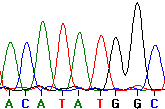 Forensic science has forever been altered by the advancement of biochemical and molecular biology tools. Consider, for example, the number of alleged convicts who have recently had convictions reversed because of DNA sequence evidence. Such techniques apply not just to current incidents, but also those reaching back into the past. Recently in Austin, Texas, an alleged serial rapist was released from prison after serving fifteen years after Forensic Scientists who analyzed DNA evidence concluded he was innocent. In the same week and city, two men serving life sentences for capital murder were similarly released after twelve years in prison, based upon new DNA findings. With states now relying on forensic evidence in both new and old cases, the need for scientists skilled in DNA analysis techniques is on the rise. (For more information, see Cutting Edge article on "DNA Fingerprinting")
Forensic science has forever been altered by the advancement of biochemical and molecular biology tools. Consider, for example, the number of alleged convicts who have recently had convictions reversed because of DNA sequence evidence. Such techniques apply not just to current incidents, but also those reaching back into the past. Recently in Austin, Texas, an alleged serial rapist was released from prison after serving fifteen years after Forensic Scientists who analyzed DNA evidence concluded he was innocent. In the same week and city, two men serving life sentences for capital murder were similarly released after twelve years in prison, based upon new DNA findings. With states now relying on forensic evidence in both new and old cases, the need for scientists skilled in DNA analysis techniques is on the rise. (For more information, see Cutting Edge article on "DNA Fingerprinting")
In addition to an increase in job openings for Forensic Scientists working on criminal cases involving physical harm, there is also a steady need for specialists who can analyze DNA to determine paternity issues. An extension of this type of work is the opportunity to apply forensic collection and analysis techniques to anthropological specimens. Because DNA, in particular, is so stable, useful sequence information can be obtained from specimens such as frozen remains of humans and other animals such as wooly mammoths. Scientists have recently been able to get DNA sequences from insects entrapped in amber for several million years and study fossilized remains of ancient leaves entombed for up to 30 million years. While the total number of jobs available in these areas is relatively small, many museums are expanding their staffs to encompass these newly developing areas.
Food Safety and Food Quality
 The relationship between your current studies in biochemistry and questions about food safety may not be readily apparent. However, scientists who can perform sophisticated biochemical assays are required for the testing of foodstuffs for toxins (which occurs, for example, in contaminated seafood), prevention of the importation of harmful fungi in wheat, and similar testing for bacteria in ground beef, as well as monitoring levels of pesticides in foodstuffs. In many instances, the amounts of contaminants (such as toxic E. coli strains) can be extremely small, but detecting them is vital. Scientists proficient in amplification techniques such as the polymerase chain reaction (PCR) have proven invaluable in detecting harmful contaminants in food. Job openings in food safety and food quality include positions with regulatory agencies such as the FDA and USDA as well as with private food producers.
The relationship between your current studies in biochemistry and questions about food safety may not be readily apparent. However, scientists who can perform sophisticated biochemical assays are required for the testing of foodstuffs for toxins (which occurs, for example, in contaminated seafood), prevention of the importation of harmful fungi in wheat, and similar testing for bacteria in ground beef, as well as monitoring levels of pesticides in foodstuffs. In many instances, the amounts of contaminants (such as toxic E. coli strains) can be extremely small, but detecting them is vital. Scientists proficient in amplification techniques such as the polymerase chain reaction (PCR) have proven invaluable in detecting harmful contaminants in food. Job openings in food safety and food quality include positions with regulatory agencies such as the FDA and USDA as well as with private food producers.
Enology and Brewing
Just as many of the food production industries have an increasing need for professionals with biotechnology skills, so, too, do the brewing and winemaking (enology) sectors. Vintners and brewers skilled in HPLC and mass spectrophotometric analysis, for example, are much better able to maintain the quality of their wine and beer. In addition, there are consistent needs within breweries and wineries for people capable of promoting the safe handling, storage, and processing of various crops used to make wine and beer.
Multilingual Opportunities
 Those who are fluent in more than one language have some special career opportunities. This can include assisting with the establishment of branches of foreign concerns in the United States to facilitating investments by U.S. firms in other countries. An ability to effectively assess both the fixed assets, and even more importantly, the intellectual assets of a potential foreign acquisition, is a widely sought after talent. Translations of technical documents from one language to another often provide an opportunity for a home-based business. There is a considerable shortage of professionals to undertake the critical tasks of accurate translation of biotech and medical transcripts. In the same vein, challenging positions exist for individuals who can facilitate multi-national drug trials.
Those who are fluent in more than one language have some special career opportunities. This can include assisting with the establishment of branches of foreign concerns in the United States to facilitating investments by U.S. firms in other countries. An ability to effectively assess both the fixed assets, and even more importantly, the intellectual assets of a potential foreign acquisition, is a widely sought after talent. Translations of technical documents from one language to another often provide an opportunity for a home-based business. There is a considerable shortage of professionals to undertake the critical tasks of accurate translation of biotech and medical transcripts. In the same vein, challenging positions exist for individuals who can facilitate multi-national drug trials.
SALARY EXPECTATIONS
 The following salary information will give you an idea of compensation levels for various fields related to biochemistry and biotechnology. The data is drawn from the National Association of Colleges and Employees (NACE) Salary Survey of March 2000. The information is intended to give you general remuneration information, and will likely change based upon the economy and market needs.
The following salary information will give you an idea of compensation levels for various fields related to biochemistry and biotechnology. The data is drawn from the National Association of Colleges and Employees (NACE) Salary Survey of March 2000. The information is intended to give you general remuneration information, and will likely change based upon the economy and market needs.
NACE Salary Survey (C&E News, March 2000) |
|
|
Starting Salaries for Bachelor’s Degree Graduates |
|
Field |
Yearly Salary |
|
Chemistry/Biochemistry |
30,000 – 38,000 |
RESEARCHING THE RIGHT JOB FOR YOU
RESEARCHING THE RIGHT JOB FOR YOU
RESEARCHING THE RIGHT JOB FOR YOU
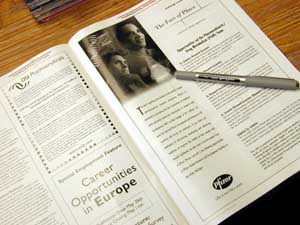 One good way to determine scientific opportunities available is to peruse the advertisements (not just the job openings) of periodicals such as "Science" and "Chemical and Engineering News."
One good way to determine scientific opportunities available is to peruse the advertisements (not just the job openings) of periodicals such as "Science" and "Chemical and Engineering News."
Note the ads for peptide and oligonucleotide synthesis, for custom antibodies, for DNA sequencing, and bio-imaging. All of these services are experiencing substantial growth and this, in turn, signifies plenty of job opportunities for you!
COMPANY DETAILS
Where can you find out more about the companies and agencies you are considering for employment? The first step is often the college library where one can consult many useful directories such as Standard and Poore’s Register, the Thomas Register, and more specialized information about particular industries. Much of this information can be obtained on the Internet. General search engines such as http://www.yahoo.com and http://www.google.com are excellent places to begin your search.
GET A HEAD START WITH INTERNSHIPS
 An excellent way to determine if a profession is right for you is to secure an internship. These can be full-time internships during the summer or part-time during the school year. With the very tight employment market for employees, many companies and governmental agencies offer a range of internship opportunities. An internship offers a way for you, as the potential employee, to experience the operations and responsibilities of the job firsthand and determine if it really meets your career expectations. While research internships have long been available in university and medical school settings, they are becoming increasingly available in biotech companies as well. Check with your college job placement and counseling offices for opportunities. If you have an interest in some of the less traditional areas for biochemists such as working in legal or business management firms, inquire about internship possibilities in these fields. In addition to providing you with real-world experience in a particular field, internships offer an ideal opportunity to enlarge your network of professional contacts who can be invaluable in helping you land the eventual full-time position.
An excellent way to determine if a profession is right for you is to secure an internship. These can be full-time internships during the summer or part-time during the school year. With the very tight employment market for employees, many companies and governmental agencies offer a range of internship opportunities. An internship offers a way for you, as the potential employee, to experience the operations and responsibilities of the job firsthand and determine if it really meets your career expectations. While research internships have long been available in university and medical school settings, they are becoming increasingly available in biotech companies as well. Check with your college job placement and counseling offices for opportunities. If you have an interest in some of the less traditional areas for biochemists such as working in legal or business management firms, inquire about internship possibilities in these fields. In addition to providing you with real-world experience in a particular field, internships offer an ideal opportunity to enlarge your network of professional contacts who can be invaluable in helping you land the eventual full-time position.
Teamwork and Flexibility
Today’s workplace typically involves small teams of workers. As such, employers will want to know that you can work well with others and that you are flexible with respect to moving from one assignment to another. Assignments in industry, for example, are often short-term, requiring employees to transition frequently from project to project. Your ability to be flexible and work collaboratively will be an asset to your employer.
GETTING HELP ALONG THE WAY
Finally, a few words about actually getting a job in your chosen career field. You must treat the process of landing a job like a job itself. Take advantage of the extensive job placement services available at most colleges and universities. These facilities often have close ties to local industry and can give you much information about available positions in your region and throughout the nation. If you are uncertain about the exact career path to take, contact your local career guidance center which can offer advice and assist with aptitude testing. These facilities can also provide help preparing appropriate resumes, hints on effective interviewing techniques, and assistance in communication skills—elements of the job search that are often of as much importance as your technical credentials!
You will need all the help you can get in choosing and getting the job that best suits you. Reach out to family, friends, professors, and acquaintances. Always ask these people if they can suggest others who might also be able to help in your job search. You will usually be pleasantly surprised at how many people are willing to help if they sense that you are really serious in your quest. Effective networking plays a large role in landing employment. The bigger the chain, the better the chance of success.
In a nutshell, seek assistance, do your research, be committed, and always demonstrate professionalism.
 |
 |
Copyright 2006, John Wiley & Sons Publishers, Inc. |
 |
 |
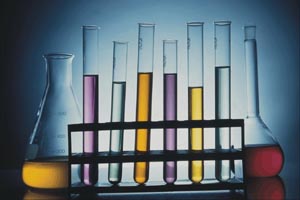 Thinking about a job once you graduate from college? You have probably already given this momentous event quite a bit of consideration. If not, you should definitely be making a start in this direction. With a robust general economy and with extraordinary advances being made in areas such as biotechnology and biopharmaceuticals, excellent positions are available in a wide variety of fields for current and future college graduates. In fact, the most difficult part of job hunting may, in fact, be making a decision about what type of career and exactly what field will be best for you. In this "Cutting Edge" section, we have provided you with information to help you get started on your journey. Getting started on making choices and moving along is important. It helps to remember that such choices are not written in stone. Today it is the norm to change jobs relatively frequently during a working career, sometimes to positions in very similar fields, and occasionally to make radical changes in direction. Do not think that your first position after college will determine your career for the rest of your life. Rather, determine what is best for you at this time and make a start on the job of ‘getting a job’!
Thinking about a job once you graduate from college? You have probably already given this momentous event quite a bit of consideration. If not, you should definitely be making a start in this direction. With a robust general economy and with extraordinary advances being made in areas such as biotechnology and biopharmaceuticals, excellent positions are available in a wide variety of fields for current and future college graduates. In fact, the most difficult part of job hunting may, in fact, be making a decision about what type of career and exactly what field will be best for you. In this "Cutting Edge" section, we have provided you with information to help you get started on your journey. Getting started on making choices and moving along is important. It helps to remember that such choices are not written in stone. Today it is the norm to change jobs relatively frequently during a working career, sometimes to positions in very similar fields, and occasionally to make radical changes in direction. Do not think that your first position after college will determine your career for the rest of your life. Rather, determine what is best for you at this time and make a start on the job of ‘getting a job’!